“Love me when I least deserve it, because that’s when I really need it.”
Swedish Proverb


“Love me when I least deserve it, because that’s when I really need it.”
Swedish Proverb

A half dozen recent studies demonstrate the power that connecting with strangers has to make us happier. Research also suggests that that talking to strangers makes us luckier.
In one study, researchers randomly assigned volunteers to talk to the strangers who sat down next to them on the train during their morning commutes. Pretty much no one thought they were going to enjoy giving up their solitude to make small talk with someone they didn’t know and would probably never see again. But guess what? The volunteers enjoyed their commutes more than the people in the study who got to read their books and finish their crossword puzzles in silence. What’s more, not a single study participant was snubbed. Other research indicates that the strangers being chatted up in public spaces similarly think they won’t want to talk, but then end up enjoying themselves.
In another study, researchers measured how much people enjoyed interacting with people they barely knew, and how much they enjoyed connecting with loved ones. Turns out that interacting with both types of people made both introverts and extroverts happier — and the more social interactions they had, the happier people were.
Finally, research shows that even just acknowledging someone else’s presence by making eye contact and smiling at them helps people feel more connected. So yes: Talking to strangers strangely makes us happy.
Take Action: See how many strangers you can interact with today. Smile at the woman you pass getting on the bus. Chat up the barista. Compliment the grocery checker.
Join the Discussion: How does talking to strangers make you feel? Inspire others in the comments!

“Lucky people meet their perfect partners, achieve their lifelong ambitions, find fulfilling careers, and live happy and meaningful lives. Their success is not due to their working especially hard, being amazingly talented, or being exceptionally intelligent. Instead, they appear to have an uncanny ability to be in the right place at the right time and enjoy more than their fair share of lucky breaks.”
—Dr. Richard Wiseman
Which of the lucky behaviors described in the video seems the most fun for you to practice with your kids? Pick one and schedule it. For example:
(1) Practice making eye contact with strangers, or making a new friend.
(2) Have fun with a new experience.
(3) Do some relaxing.
(4) Play good luck…bad luck…who knows?
More About Raising Lucky Kids:
![]() If you would like to download the audio version of this video to listen to in your car or on the go, click the link below. DOWNLOAD THE AUDIO VERSION HERE.
If you would like to download the audio version of this video to listen to in your car or on the go, click the link below. DOWNLOAD THE AUDIO VERSION HERE.
This video is the 2nd in a series about fostering the skills of luck, optimism, and generosity from The Raising Happiness Homestudy. Check out the rest of the Homestudy here.
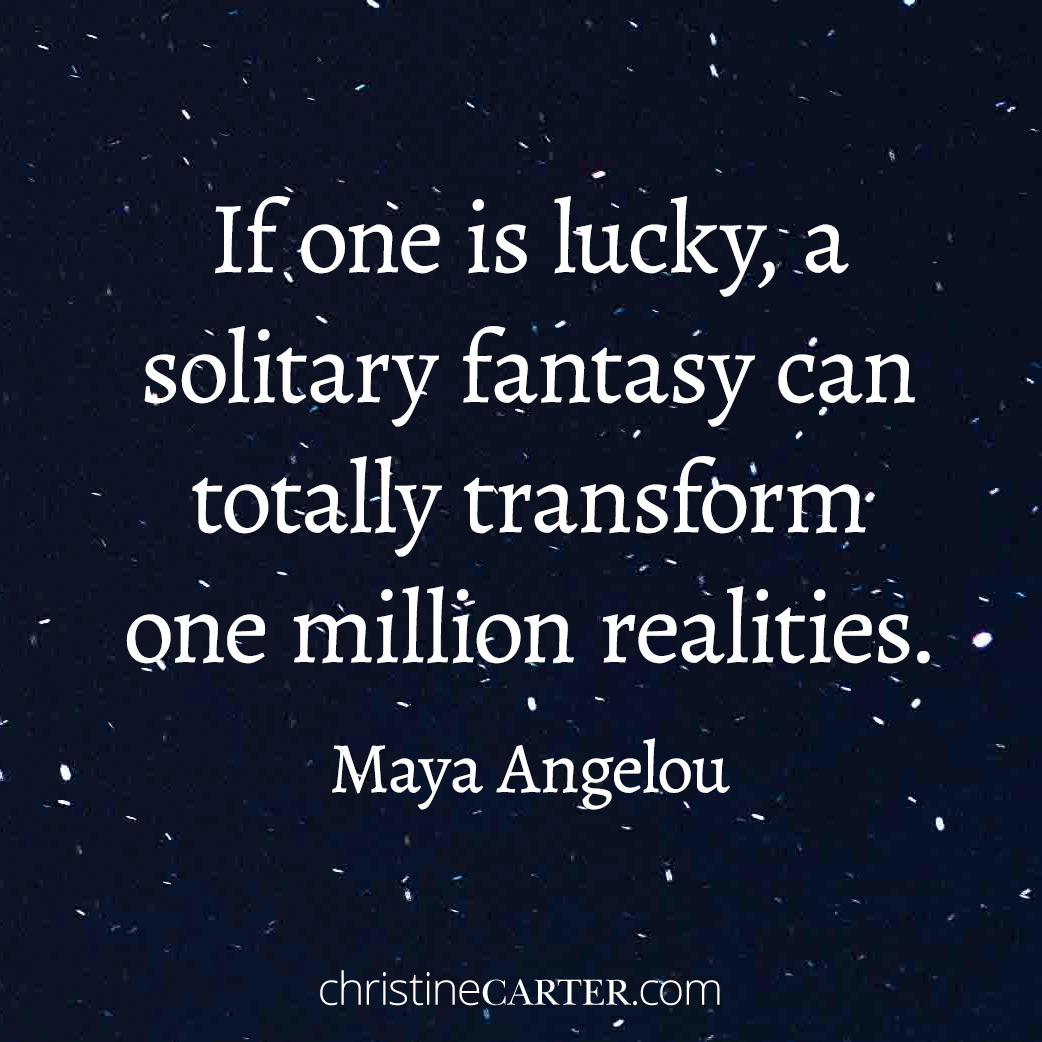
“If one is lucky, a solitary fantasy can totally transform one million realities.”
Maya Angelou


Luck is a dividend of sweat. The more you sweat, the luckier you get.
Ray Kroc
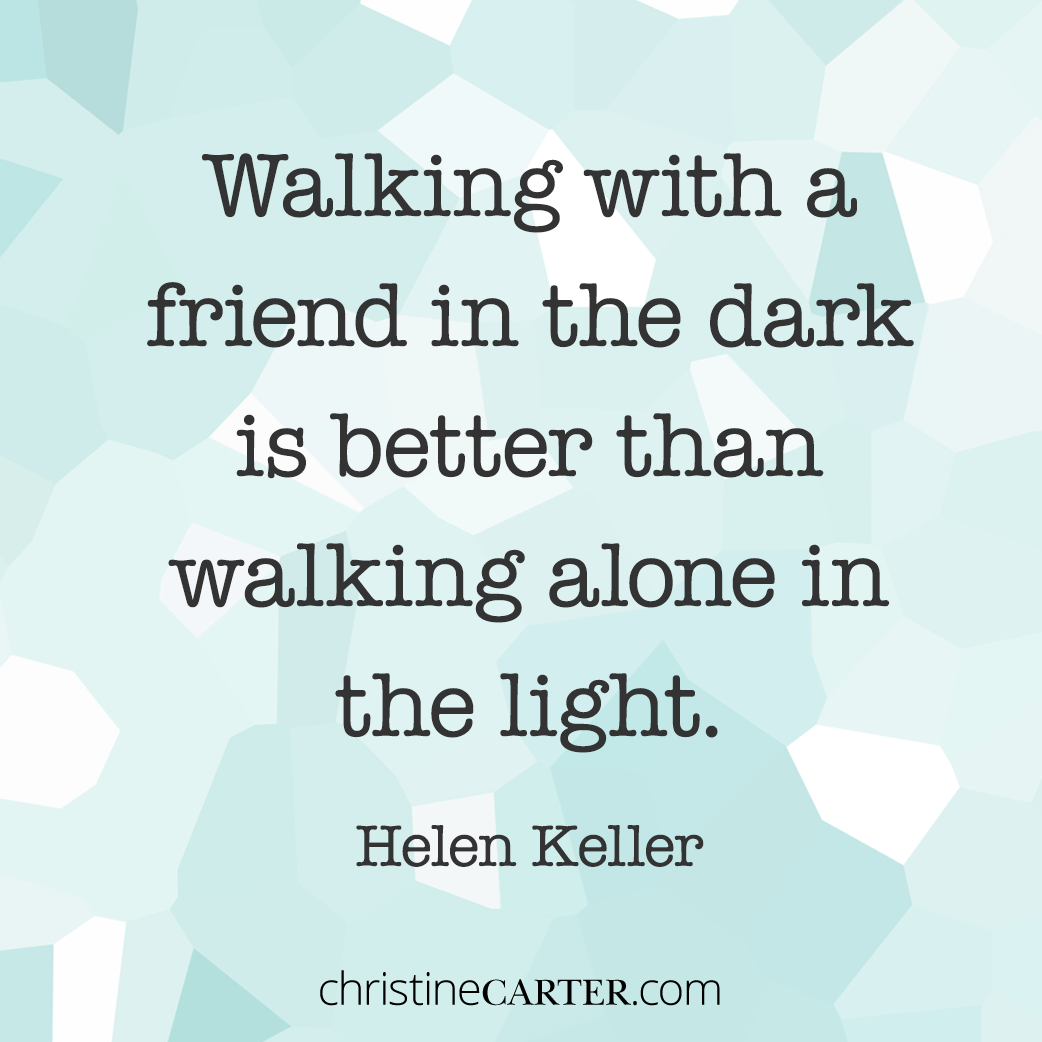
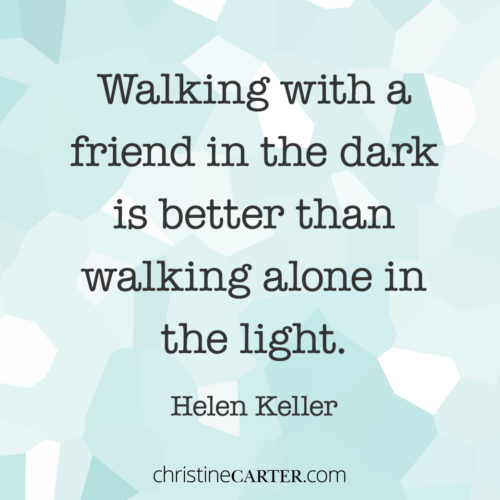
“Walking with a friend in the dark is better than walking alone in the light.”
Helen KellerAs we look ahead to the weekend and springing our clocks forward–and a little more light–I like this reminder to savor the opportunity to warm up with friends these last few dark days.
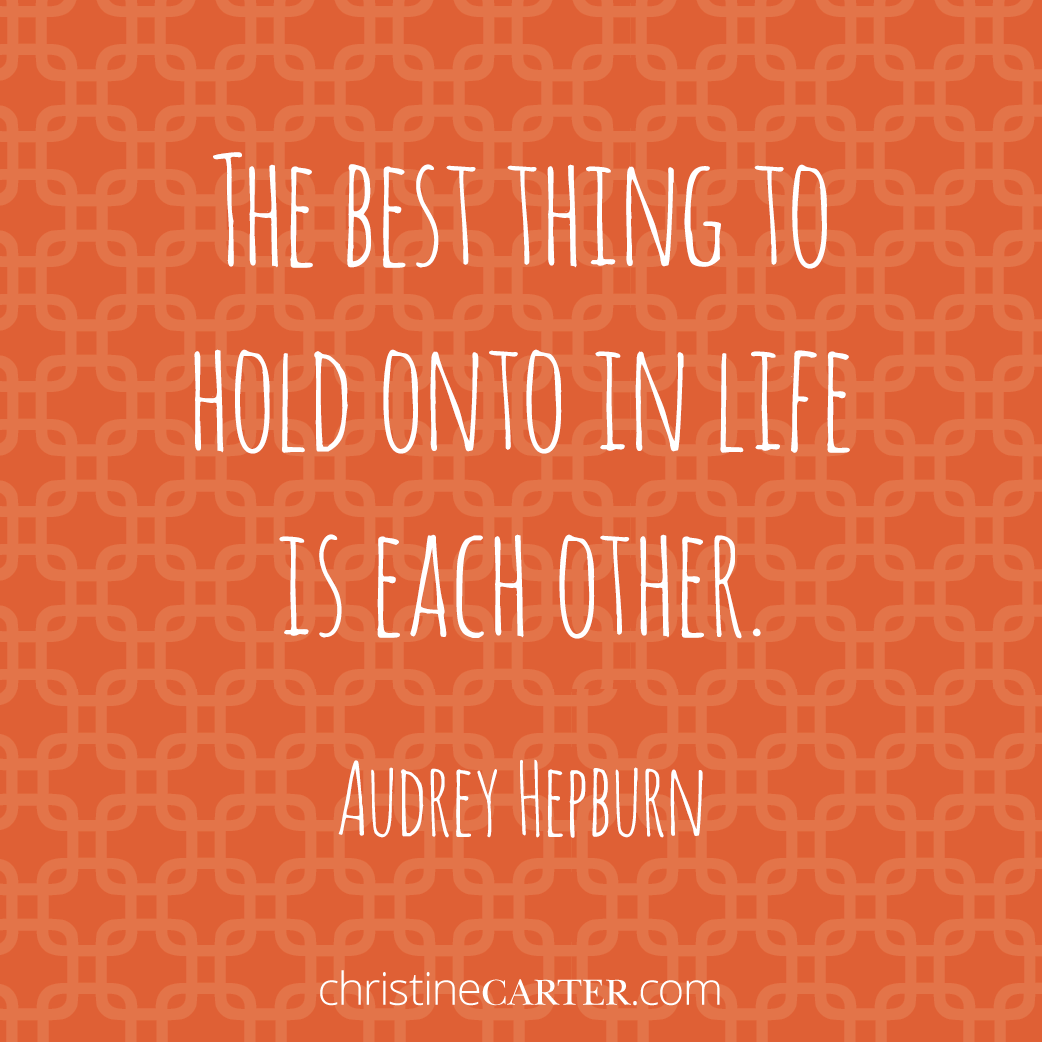
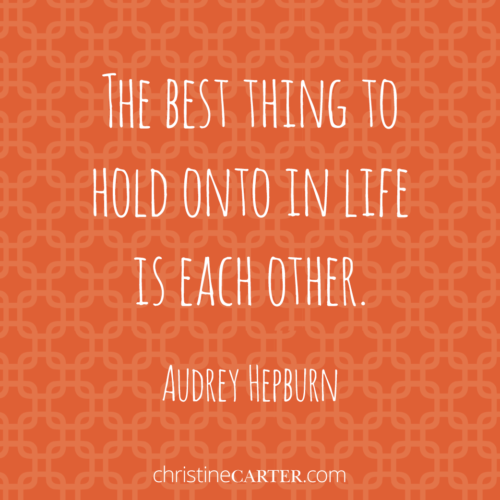
“The best thing to hold onto in life is each other.”
Audrey Hepburn

I find it ironic that the month after Valentine’s Day tends to be the busiest time of the year for divorce lawyers (or so they say). Seems that many people are not feeling as much love and romance as Hallmark would hope.
I have a theory about this.
If I asked my grandmother if her late husband was her best friend, her provider, her lover, and her partner in parenting and life—her go-to guy for emotional fulfillment, practical help, AND the center of her social universe—she would have laughed uproariously.
She did love her hubby until the day he died and she missed him so much she wept when she would talk about him more than 30 years after his death. But my Opa wasn’t her best friend (her girlfriend Beulah was). She didn’t rely on him for help raising the kids or with the housework (times have changed!), nor did she expect him to understand her feelings. She relied on herself for happiness and fulfillment—and truthfully, she didn’t have high expectations there, either.
But she’d tell you she had a wonderful marriage. When I asked her if she had had a happy life (she lived to be 104 years old), she giggled at the absurdity of the question. Clearly she did.
And yet, like most of my peers, I would not sign up for her life—or, in particular, her marriage. Today, we expect our spouses to be our partners in just about every realm. We expect them to be our co-parents, our household running mates, and to help provide for our family financially. We’d think there was something wrong if they didn’t consider us their soul mate, their go-to buddy, and their lover.
Our expectations hugely influence our perceptions, and therefore our decisions, our experiences, our judgments, and ultimately, how we feel. Share on X
Like individuals, couples are increasingly isolated from the outside sources of support that previous generations had, and so our partners have become our primary sources of emotional (and for some, spiritual) fulfillment. When we aren’t happy, it is easy—and quite common—for our generation to blame our spouse for it.
There is an expectations paradox here: The demands put on our relationships have become so great—and our expectations of them have gotten so high—that we are more likely to be disappointed when we don’t get what we want from our partners than we are to feel grateful when we do.
My grandmother expected very little from her husband—I imagine only that he provide her with financial stability, and that he be faithful to her. My grandfather delivered on these things, and as an added bonus, shared with her a love of dancing, a social life full of mutual friends and dinner parties, and a muted joy in raising children and grandchildren.
My grandmother was content not so much because of what she had in her husband, but because of what she lacked in her expectations. This is both ironic and instructive for our generation.
Consider the study where Duke professor Dan Ariely, author of the book Predictably Irrational, had research subjects try two different types of beer. One was Budweiser; the other was Budweiser with balsamic vinegar added to it.
The majority of subjects vastly preferred the Bud and vinegar concoction—when they weren’t told what it was. When they were informed before they tasted it, they hated it.
Ariely’s conclusion is that when people believe that something might be distasteful, they’ll experience it negatively, even if they would have liked it otherwise. The reverse is also true.
In other words: Our expectations hugely influence our perceptions, and therefore our decisions, our experiences, our judgments, and ultimately, how we feel.
But the idea that we should just lower our expectations of our spouses and call it a day is inherently unfulfilling. Seriously: Is the answer really to just lower the bar?
I can’t think of anyone for whom this would work. We can’t just drop our beliefs–especially our long-held romantic notions about who are partners should be to us–without replacing them with new beliefs and values that feel as true or truer to us.
So what do we do? How much can we really expect of our spouses and still be happy? If expectations create relationship-killers, like nagging, contempt, and criticism, how can we respond constructively when our expectations aren’t met?
I’ve spent years combing the research for answers to these questions. I’ll be sharing what I’ve learned on the first live call of my Brave Over Perfect Group Coaching on Friday, March 1. We’ll be digging deeper into the misery of high expectations, and more specifically what to do when our partners don’t measure up. Learn more or enroll now.

These days, you can have both an actual life AND a life you present to others that’s been optimized for your audience. There can be what really happened, and ALSO what happened as captured on Instagram or Facebook or Snapchat. There’s how you really look, and how you look after you whiten your teeth or crop out that belly fat. There’s how you actually feel after a workout (sore, depleted, out-of-shape?) and what you post about your latest exercise class (OMG! I am so sweaty and inspired after SoulCycle!!)
Although you may not go out of your way to create a complete facade of awesome for your online persona, the lure of wishful thinking is real. Slowly, the filtered colors (lark? lo-fi?) of a funnier, sexier, more intelligently-lived life can take over.
Online, it’s a perception game. But is that game bleeding over into your offline life? What happens when you fib to your coworker about how great your weekend was (why not be consistent with what you posted on Instagram?) when actually, your weekend sucked and you’re feeling pretty depressed and anxious. So what?
You may not want to reveal that you and your significant other had a major fight over the weekend, but if you pretend that you are okay — and you’re not — you’ll probably make the people around you feel worse, too. Research shows that when we accept and let ourselves feel (and even express) what is going on emotionally for us, our overall happiness increases and depression decreases. (Ironically, research shows that people who regularly suppress difficult emotions tend to experience more negative emotions overall.)
A consistent benefit of letting ourselves feel what we feel is that our relationships tend to improve, sometimes dramatically. For example, the less often that people report suppressing their emotions over a two-week period, the better they tend to feel about their relationships over the course of three months. This sort of authenticity predicts the tendency to avoid destructive behavior in intimate relationships. More than that, it predicts greater relationship quality overall.
Why?
Because authenticity creates intimacy. Research shows that people in romantic relationships are most intimate with and most committed to romantic partners who see them as they see themselves; connection and intimacy in our relationships depend on our feelings of being understood. In other words, when our romantic partners see us the way that we see ourselves — which they can only do if we don’t hide our feelings or pretend to be better than we are — our relationships last longer and are more fulfilling.
Take Action: This week, show someone who you really are.
Join the Discussion: What benefits have you experienced from showing people who you really are? When has pretending backfired for you or someone you know?
* * * * *
If you want closer friendships and better relationships, consider joining my Brave Over Perfect coaching group. This is a great time to join, as you’ll get two themes for the price of one.
All three Habits & Resolutions call recordings and resources will stay up until the end of February. We’ll kick off March with some of the best research-based advice related to relationships and marriage. Learn more or enroll now.


“I’m not in this world to live up to your expectations and you’re not in this world to live up to mine.”
Bruce Lee